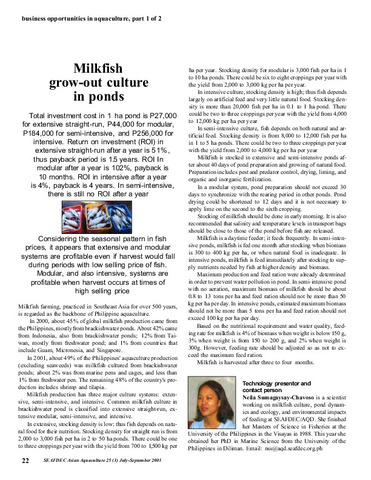Ration reduction, integrated multitrophic aquaculture (milkfish-seaweed-sea cucumber) and value-added products to improve incomes and reduce the ecological footprint of milkfish culture in the Philippines
| dc.contributor.author | de Jesus-Ayson, Evelyn Grace T. | |
| dc.contributor.author | Borski, Russel J. | |
| dc.date.accessioned | 2019-11-21T08:50:11Z | |
| dc.date.available | 2019-11-21T08:50:11Z | |
| dc.date.issued | 2012 | |
| dc.identifier.citation | de Jesus-Ayson, E. G. T., & Borski, R. J. (2012). Ration reduction, integrated multitrophic aquaculture (milkfish-seaweed-sea cucumber) and value-added products to improve incomes and reduce the ecological footprint of milkfish culture in the Philippines. In Technical Reports: Investigations 2009-2011 (Vol. 2, pp. 320–335). Corvallis, Oregon, USA: AquaFish Collaborative Research Support Program, Oregon State University. | en |
| dc.identifier.uri | http://hdl.handle.net/10862/3552 | |
| dc.description.abstract | In the Philippines, cage culture of milkfish in marine environments is increasing. The practice uses high stocking densities, with significantly greater inputs of artificial feeds which more often than not, have led to excessive feeding and consequently excessive nutrient loading in receiving waters, exacerbating problems with pollution. These could have contributed to occurrence of periodic fish kills in areas of marine milkfish culture clusters. In marine cage culture, about 80% of variable expenses are attributable to feed costs. Experiments were conducted to compare production characteristics of milkfish fed on alternate days versus those raised on daily feeding in marine cage culture. Fish were fed either daily or every other day using a reduced feed ration at 7.5% of fish biomass at the start of culture down to 3% of fish biomass towards harvest. We showed this ration level was as effective as the industry standard that begins at a rate of 10% average body weight. Morevover, we had previously found that milkfish reared in brackishwater ponds on an alternate day feeding scheme using the reduced ration level produced a 56% cost savings in feed with little impact on total yield relative to fish raised on a daily feeding protocol. In the present study, survival rates (~ 90%) were comparable between the control fish fed daily and groups fed on alternate days in marine cages. Similarly, total harvested biomass of fish in the alternate day and daily feeding groups was similar as was the harvest value, although fish on the alternate day feeding scheme grew slightly less. The amount of feed and the corresponding cost of feeds consumed were significantly lower in stocks that were fed on alternate days compared with those fed daily (P < 0.05). Feed conversion ratio (FCR) was lower in the alternate-day fed group (FCR = 2.46) relative to stocks fed daily (FCR = 3.59). Overall, the results demonstrate that feed costs can be reduced by around 32% in stocks fed on alternate days, which yields an estimated 20-25% improvement in production efficiency relative to raising animals on a daily feeding protocol. Hence, a significant costs savings with reduced impact of nutrient loading in the environment is likely to be realized for farmers who adopt an alternate day feeding scheme in raising milkfish in marine cages. | en |
| dc.language.iso | en | en |
| dc.publisher | AquaFish Collaborative Research Support Program, Oregon State University | en |
| dc.relation.uri | https://aquafishcrsp.oregonstate.edu/sites/aquafishcrsp.oregonstate.edu/files/09mne02nc_ration_reduction.pdf | en |
| dc.subject | milkfish | en |
| dc.subject | sea cucumbers | en |
| dc.subject | Kappaphycus alvarezii | en |
| dc.subject | Chanos chanos | en |
| dc.subject | Holothuria scabra | en |
| dc.subject | Philippines | en |
| dc.subject | Skip feeding | en |
| dc.title | Ration reduction, integrated multitrophic aquaculture (milkfish-seaweed-sea cucumber) and value-added products to improve incomes and reduce the ecological footprint of milkfish culture in the Philippines | en |
| dc.type | Book chapter | en |
| dc.citation.spage | 320 | |
| dc.citation.epage | 335 | |
| dc.citation.bookTitle | Technical Reports: Investigations 2009-2011 | en |
| dc.subject.asfa | cage culture | en |
| dc.subject.asfa | seaweeds | en |
| dc.subject.asfa | feeding experiments | en |
| dc.subject.asfa | feeding | en |
| dc.subject.asfa | polyculture (aquaculture) | en |
| dc.subject.asfa | milkfish culture | en |
| dc.subject.scientificName | Chanos chanos | |
| dc.subject.scientificName | Gracilariopsis heteroclada | en |
Files in this item
| Files | ขนาด | รูป | View |
|---|---|---|---|
|
There are no files associated with this item. |
|||
รายการนี้ปรากฏใน (s)
-
Books and Book Chapters [123]



